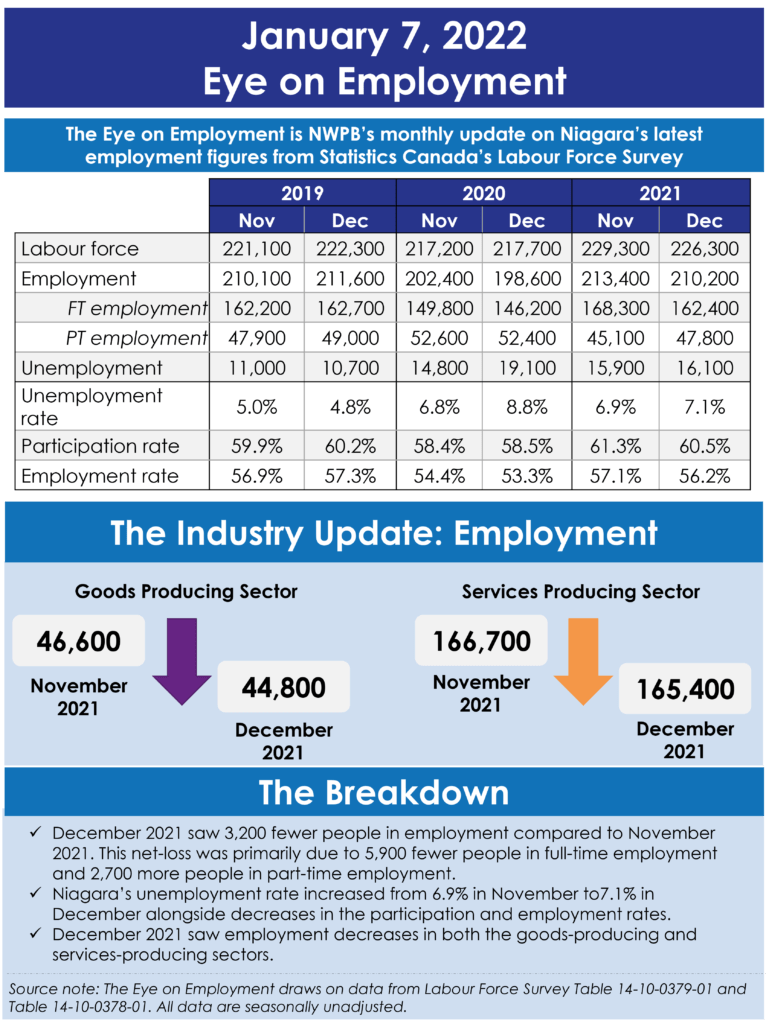
In this edition:
Ontario to allow third-party renewables installation, expand access to net-metering
Number of Niagara EI claimants dropped 13% in February, down 75% year-over-year
FAO: Average Ontario family receives net benefit of $846 from provincial government
Ontario to allow third-party renewables installation, expand access to net-metering
The government has made amendments to Ontario’s net metering regulation (O. Reg. 541/05), under the Ontario Energy Board Act, 1998, and consequential amendments to O. Reg. 389/10 (General) under the Energy Consumer Protection Act, 2010.
The regulatory changes introduced today will allow interested customers to enter into agreements with a third-party to install renewable generation systems, like rooftop solar. This new option will expand access to net metering, which allows customers to generate electricity on their property for their own use, while sending excess power to the grid for a credit on their bill, lowering their electricity bill.
Click here to find your utility provider.
Number of Niagara EI claimants dropped 13% in February, down 75% year-over-year
The number of Niagara residents claiming regular Employment Insurance (EI) benefits in February dropped to 7,090 from 8,180 in January and from a pandemic-era high of 28,800 in May, 2021. In February 2021, 28,100 Niagara residents were claiming EI; that figure has fallen by over 75% in 12 months.
Nationally, approximately 565,000 Canadians received regular Employment Insurance (EI) benefits in February, down by 68,000 (-10.8%) from a month earlier.
Niagara’s larger drop is likely explained by the stronger representation of the accommodation and food service industry in our economy. In Canada, the number of beneficiaries who most recently worked in accommodation and food services fell by 21,000 (-27.5%) between January and February 2022 (not seasonally adjusted). Despite the decline, regular EI beneficiaries who recently worked in accommodation and food services accounted for 7.6% of all beneficiaries in February 2022, higher than the February average of 5.8% between 2018 and 2020.
FAO: Average Ontario family receives net benefit of $846 from provincial government
The Financial Accountability Office of Ontario (FAO) has released a report on the impact of provincial spending and revenue collection on Ontario families. The FAO estimates that in 2019-20, Ontario’s 6.5 million families[1] contributed an average of $23,426 in revenue to the Province and received an average of $24,272 in services or payments, resulting in an average net benefit of $846 per family.
Although the average family in Ontario received a net benefit from the provincial government, there was a wide variation across families, with 60% receiving more in government services and payments than they contributed in revenue, 20% breaking even, and 20% contributing more in revenue than they received in services and payments.
The most important factor was family income: those earning less than $76,296 were net beneficiaries, those earning between $76,926 and $131,473 were in a net neutral position, and those earning $131,474 or more were net contributors.
Reading Recommendations
Zoom’s thumbs-up and raise-hand gesture recognition now works in its desktop apps
The Verge
Zoom’s reaction emoji are one of the platform’s handiest features, letting you quickly applaud a co-worker or send a heart to a friend. With the latest update to its desktop apps, Zoom is making a couple of those reactions easier to find. Its gesture recognition feature will show a thumbs-up emoji in the meeting when you give one to your webcam, or flag a raised-hand emoji when you raise your hand.
Gesture recognition won’t be news to those who use Zoom’s iPad and iPhone apps, which have supported the same two gestures since last summer. And those who have used it know that it can be as frustrating as it is helpful. Zoom has a tendency to read “I’m scratching my face” as “I’m raising my hand,” and at least in my experience only responds to the most aggressive of thumbs-ups. Still, when it works it does help Zoom bridge the gap between natural and digital communication, and it’s not surprising that the company is still investing in the idea.
How will streaming services pivot as they face challenges in adding subscribers?
CBC News
Streaming services that revolutionized how people consume entertainment are now facing a host of challenges when it comes to growing — or even sustaining — their subscriber base.
On Tuesday, Netflix’s first-quarter earnings showed the streaming service lost 200,000 subscribers — its first decline since 2011. The results rattled investors, and Netflix’s stock took a 37 per cent plunge by Thursday morning.
The market was expecting weak performance in this last quarter, but the extent of the drop came as a “total shock,” said senior Bloomberg Intelligence analyst Geetha Ranganathan.
“It raises questions about the ultimate endgame for Netflix, of course, and for all streamers,” she said.
Update on Ukraine
Russia sanctions 61 more Canadians, including top Trudeau staffers, premiers, mayors and journalists
CTV News
Russia has issued a fresh round of sanctions, “indefinitely” banning 61 Canadians from entering Russia, including premiers, mayors, journalists, military officials and top staffers in Prime Minister Justin Trudeau’s government.
Those named have been put on a “stop list” meaning they’d be denied entry to the Russian Federation. It’s a move Russia says is in direct retaliation for Canada’s ongoing imposition of sanctions on influential Russians in an effort to pressure Russian President Vladimir Putin to stop his military’s attacks on Ukraine.
Five premiers — Ontario Premier Doug Ford, Manitoba Premier Heather Stefanson, Saskatchewan Premier Scott Moe, Alberta Premier Jason Kenney and British Columbia Premier John Horgan — are on the latest list, published on Thursday.
Toronto Mayor John Tory and Ottawa Mayor Jim Watson have been banned from Russia, as have Canada’s ambassador to the United Nations Bob Rae, Bank of Canada Governor Tiff Macklem, Acting Clerk of the Privy Council Janice Charette, former foreign affairs minister Lloyd Axworthy, and former senator Romeo Dallaire.
Through the Daily Updates, the GNCC aims to deliver important business news in a timely manner. We disseminate all news and information we feel will be important to businesses. Inclusion in the Daily Update is not an endorsement by the GNCC.




